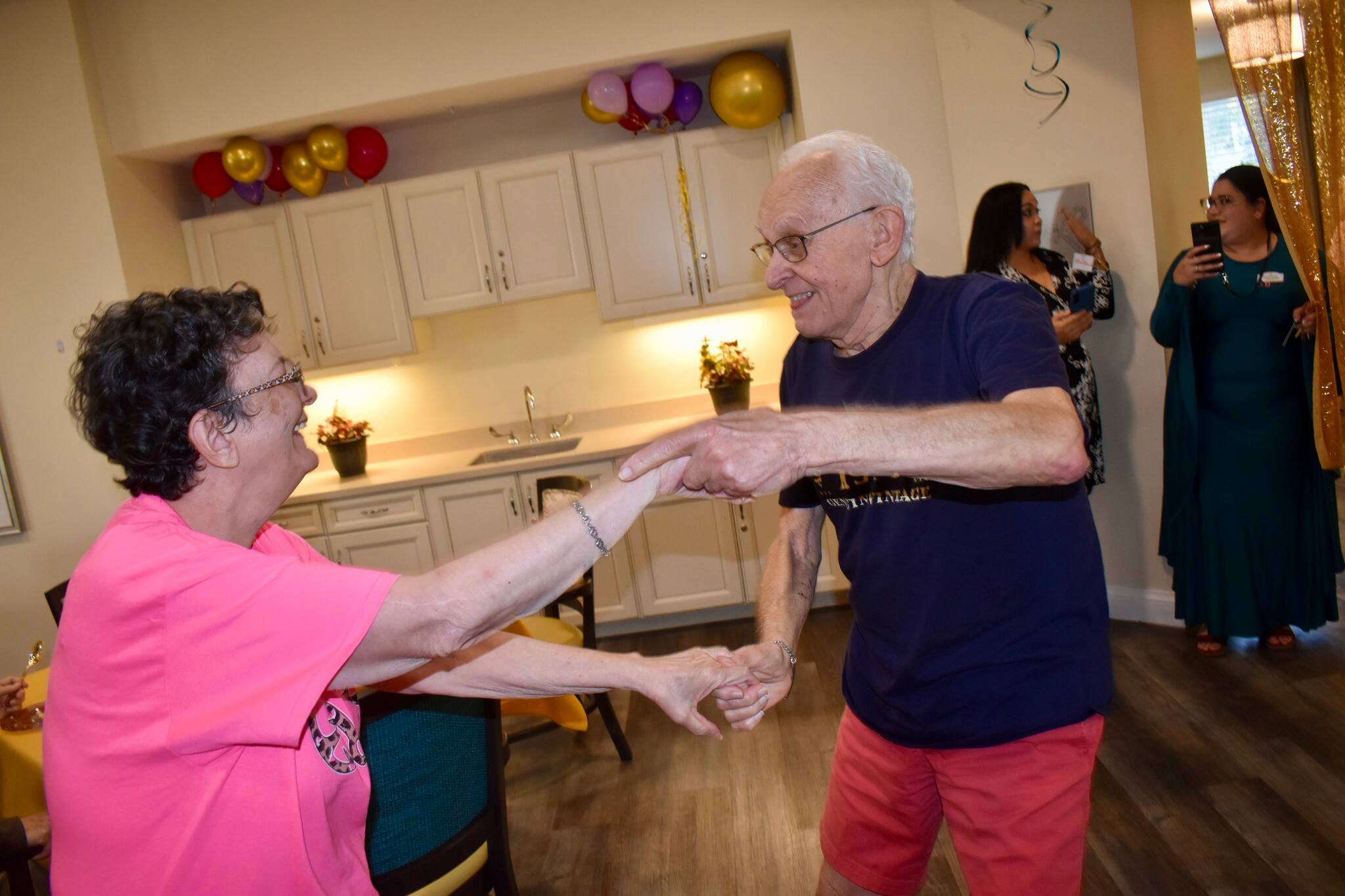Is your aging family member, once a robust and independent individual, now struggling with daily tasks? Is their once immaculate home now overwhelming for them to maintain? Are they often forgetting to take medications? Is their retirement community no longer meeting their needs?
Assisted living should be explored when it becomes evident that a loved one needs more support than you or home care services can provide. It’s a residential option for seniors who need help with daily activities like meals, medications, or personal care but want to live as independently as possible. For seniors, this bridge between living at home and a nursing home offers the right balance of support to promote independence and maintain quality of life.
Assisted living offers benefits that home ownership, in-home care, and independent living simply can’t match:
- Access to medical care
- Assistance with daily living activities
- Socialization opportunities
- Maintenance-free lifestyle
However, initiating the conversation about transitioning to an assisted living community with your aging parents can be challenging. The good news is, it doesn’t have to be.
Preparation and patience are crucial. Having empathy for how your parent feels can make the conversation much smoother. Join the senior housing experts at The Harrison of Wildwood to explore the benefits, costs, and strategies you can use when talking to your parents about assisted living.

Understanding the Transition from Home Ownership to Assisted Living
Tips for talking to your parent about assisted living include understanding their challenges and pain points. Maintaining a home as an older adult can be quite challenging:
- Home Maintenance: Picture your mother, who loves her garden but can no longer keep up with the weeding and watering due to arthritis. The house’s exterior also needs work – the gutters need cleaning, the lawn needs mowing, and the driveway needs repairs.
- Safety Concerns: Think about your father, who has always been handy around the house. But now, climbing ladders to change light bulbs or navigating the basement stairs to check on the furnace poses significant risks of falls and injuries.
- Daily Tasks: Imagine your parents, who’ve always taken pride in their well-kept home, struggling with everyday tasks. Cleaning, laundry, and even cooking have become burdensome chores due to declining health and energy levels.
The hassles of home ownership can become overwhelming, leading to stress and decreased quality of life. This is where assisted living communities can help – they offer a lifestyle free from those maintenance and worries. No more struggling with household chores or worrying about home repairs.
Assisted living communities provide personalized senior care, with team members available 24/7 to help with any needs. They also offer socialization opportunities, allowing residents to engage in various activities and make new friends. Every aspect is designed to provide peace of mind.
However, it’s important to note that some older adults may choose to stay put and utilize home care services. While this senior living option has its merits, it’s crucial to weigh it against the comprehensive benefits of assisted living communities.
Comparing In-Home Care vs. Assisted Living
One of the most common questions that seniors and family members ask is, “Is home care cheaper than assisted living?” According to the 2023 Genworth Cost of Care Survey, the answer is no, especially for those who require constant support.
In central Florida, for instance, the cost of in-home care for 44 hours per week averages around $5,911 per month, calculated at $30-$35 per hour. That figure only covers the cost of health care or homemaker services; it does not include other expenses accompanying home ownership, like groceries, bills, taxes, home maintenance, or renovations for accessibility needs.
The average monthly cost for round-the-clock care in supportive senior living communities in the same area is approximately $3,823. That fee is all-inclusive, covering meals, utilities, transportation, and other luxurious amenities, making it a more cost-effective option for many families.
Many resources can also offset the cost of assisted living:
- Long-term care insurance
- VA benefits
- Reverse mortgages
Beyond cost, the level of care offered needs to be considered.
Home Care vs. Assisted Living: Care and Services
In-home care services typically offer assistance with activities of daily living (ADLs), like bathing, dressing, meal preparation, and medication reminders. However, they may not be equipped to handle sudden medical emergencies, especially during the hours when the caregiver is not present.
Assisted living communities provide 24/7 support; team members are always available to assist residents with ADLs and respond to medical emergencies. Plus, many communities have medical professionals on-site or on-call, providing an additional layer of security. These can be selling points when talking to parents about senior living.
The Harrison of Wildwood goes a step further and provides Extended Congregate Care (ECC).
Another significant advantage of assisted living over in-home care is the opportunity for socialization activities. Assisted living communities offer various activities like fitness classes, art workshops, book clubs, and outings. These activities encourage interaction among residents, fostering a sense of community and promoting mental well-being.
In contrast, seniors receiving in-home care often experience loneliness and isolation, which can negatively impact their overall health.
While in-home care may seem like a viable option, it’s crucial to consider the full picture before making a decision:
- Care costs
- Level of care
- Quality of life
How to Talk to Parents About Assisted Living: The Right Balance
Talking to your parents about assisted living can feel like walking a tightrope, balancing respect for their independence and acknowledging their need for more care.
Remember, this conversation may not be a one-time event. Be patient, understanding, and open to their concerns and questions. The goal is to help them see assisted living as a positive step towards a more fulfilling lifestyle, not something they are forced into.
Talking to parents about assisted living can be easier when you keep the following in mind:
- Do Your Research: Before initiating the conversation, thoroughly research the available options. Understand what assisted living communities offer and how they can improve your parent’s quality of life. Reading articles like this one means you’re on the right track.
- Choose the Right Time and Place: Find a quiet, comfortable setting to have this discussion. Ensure you have plenty of time so it doesn’t feel rushed.
- Involve Family and Friends: If possible, involve other family members or close friends in the conversation. Their support can make the transition easier for your parents.
- Speak from a Place of Love: Start the conversation by expressing your concern and love. Explain that your suggestion comes from wanting to see them healthy and enjoying life.
- Focus on Quality of Life: Emphasize how assisted living can enhance their lifestyle. Talk about medical support, social activities, and freedom from home maintenance tasks.
- Highlight the Fun Aspects: Transitioning to assisted living isn’t about giving up independence. Discuss the fun aspects of the move, like designing and furnishing their new assisted living apartment – make it an exciting project that they can envision.
It’s okay to ask for help when discussing assisted living with a loved one. For additional resources, contact a geriatric care manager or The Harrison of Wildwood.
How to Furnish an Assisted Living Apartment
Moving into an assisted living apartment is a significant transition. However, with thoughtful planning and personal touches, you can help your parents make their new space feel like home.
- Personalize the Space: Encourage your parents to bring cherished items like family photos, favorite books, or a treasured piece of art. These items can provide comfort and familiarity in their new surroundings.
- Choose Comfortable Furniture: Opt for comfortable, familiar furniture your parents love. A favorite armchair or a much-loved side table can make the space feel homey.
- Downsize Thoughtfully: Moving to an assisted living community often means downsizing. Approach this with sensitivity, remembering that it’s not just about getting rid of things; this is about simplifying life and focusing on what truly matters.
Assisted living communities typically offer many common areas, which reduces the need for certain items in individual apartments. As you help your parents prepare for the move, keep in mind they likely won’t need these ten things in their new homes:
- Large kitchen appliances
- Lawn care equipment
- Extensive dinnerware
- Excessive linens and bedding
- Tools and home repair equipment
- Multiple televisions
- Large hobby collections
- Bulky furniture
- Vehicles
- Exercise equipment
Remember, the goal is to create a comfortable, personalized living space that caters to your parent’s needs and preferences while taking advantage of the amenities and services the assisted living community provides.
Let Us Help Talk To Your Parents About Assisted Living in Wildwood, FL
Every journey begins with a single step and it’s time to take one towards ensuring a fulfilling and enriching lifestyle for your loved ones. Contact us today to get the conversation started.
We look forward to welcoming you to The Harrison of Wildwood.







